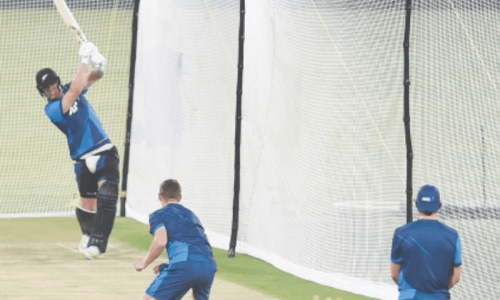TOKYO: Japan set about the unprecedented task of reorganising the Tokyo 2020 Olympics on Wednesday after making the tough decision to postpone the Games by a year as the coronavirus pandemic locks down one third of the planet.
The dramatic step to shift the Olympics, never before seen in peacetime, after the International Olympic Committee (IOC) and Japanese government finally succumbed to intense pressure from athletes and sporting bodies around the world upends every aspect of the organisation — including venues, security, ticketing and accommodation.
It is not even clear exactly when the rescheduled Games will take place.
Japan Olympic Committee (JOC) President Yasuhiro Yamashita said that the decision had come earlier than he thought it would,
but that he was determined the host nation’s athletes would be ready to compete in 2021.
“Now that the decisions have been made, let’s take this positively, reset our mindset,” he told a news conference. “With a fresh mind, not giving up, I want to go through this challenge heading into next year.”
In a move symbolic of the difficulties, Olympic countdown clocks in Tokyo switched from displaying the number of days to go to simply show today’s date and the time.
“It’s like taking seven years to build the world’s biggest jigsaw puzzle and, with just one piece to go, having to start again but now with less time to finish,” tweeted Craig Spence, spokesman for the International Paralympic Committee.
Japan has framed Tokyo 2020 as the “Recovery Games” — a chance to show the world it has bounced back from the “triple disaster” in 2011 when a massive earthquake sparked a tsunami and the Fukushima nuclear meltdown.
The delayed event — still to be called Tokyo 2020 — will now be a “testament to mankind’s defeat of the new virus”, said Prime Minister Shinzo Abe.
He repeated that message in a call with US President Donald Trump, in which the leaders agreed the Games would be “proof that humans have beaten the new coronavirus”, a Japanese government spokesman said.
Tuesday’s decision came 122 days before the planned opening ceremony at Japan’s newly built National Stadium, which was to usher in the 16-day event featuring 11,000 athletes from 206 nations and territories.
Although 14 major corporations have indicated they would remain in the IOC’s global partnership programme despite the delay, local organisers might have some negotiating to do to retain their own Games-specific sponsors.
Tokyo Gas Co Ltd said it would decide whether to continue sponsorship for another year depending on conditions, including cost.
“We don’t have an answer to whether or not we will continue our sponsorship as we have just heard about the postponement,” Tokyo Gas President Takashi Uchida told a news conference on the company’s new business plans. “We will make a decision after we learn about details.”
Athletes around the world, many struggling to train because of restrictions put in place to contain a virus that has killed more than 17,200 people, have expressed disappointment but largely welcomed the decision.
The 57 percent of athletes who had already booked spots in Tokyo face a wait to discover whether they will have to qualify again, although Australian Olympic Committee (AOC) chief executive Matt Carroll said they would not.
US athletes in the major sports of athletics, swimming and gymnastics had more clarity with their national federations announcing Olympic trials would now be held in 2021.
For some athletes, an extra 12 months might be too long and 38-year-old Swiss Nicola Spirig, who won triathlon gold at the 2012 London Olympics, said she would be considering her options.
“I am ... glad to have clarity now and fully support the IOC’s decision [but] as far as my sporting future is concerned, the decision obviously has an impact,” the four-times Olympian posted on Instagram.
For others, including Japanese tennis player Kei Nishikori and Olympic sprint champion Wayde van Niekerk, it will provide extra time to get fit for the Games after injury setbacks.
“This gives me more time to work and strengthen myself to be in even better shape for the Olympic Games,” van Niekerk, whose world record run in the 400 metres final was one of highlights of the Rio Olympics, told South Africa’s Daily Maverick. “As much as it is a downer that it’s not happening this year, it will still happen.”
The Olympic torch relay, due to begin from Fukushima Thursday, has also been postponed but the flame will stay in the area until it is safe to begin.
Tokyo 2020 president Yoshiro Mori, an 82-year former prime minister and cancer survivor, pointed to his own health battles as inspiration for the difficult times ahead.
“We have no choice but to have hope. I myself suffered cancer... But I was saved by a new drug. I am here, allowed to live. Let us hope for these things.”
Published in Dawn, March 26th, 2020













































